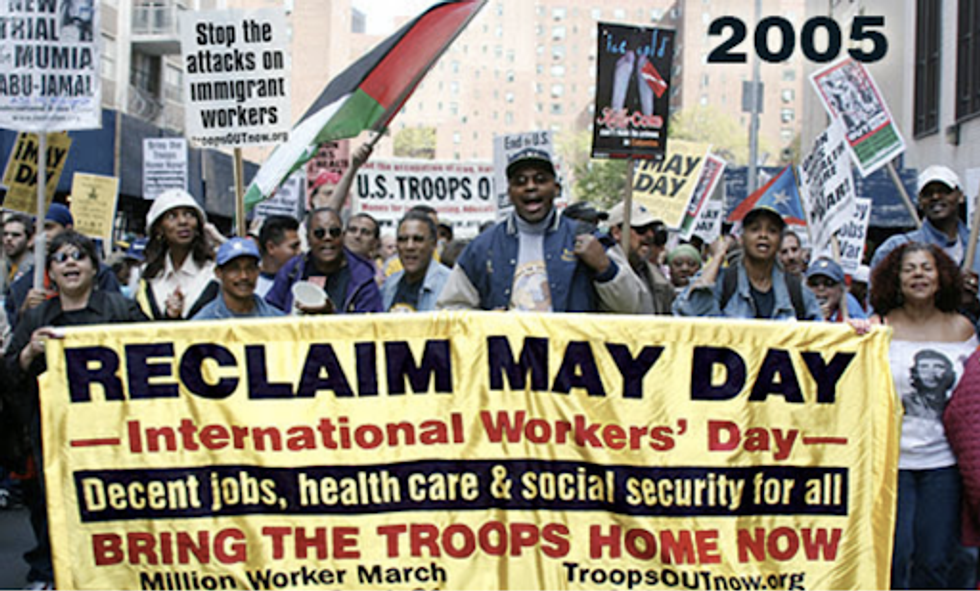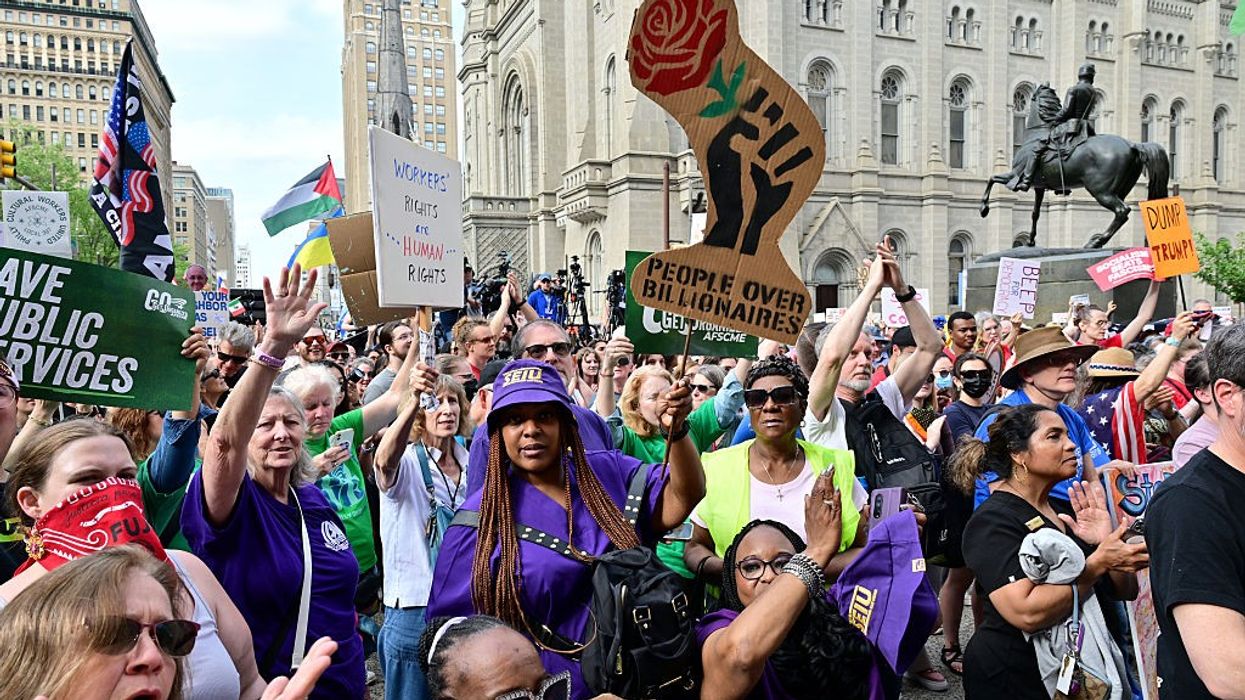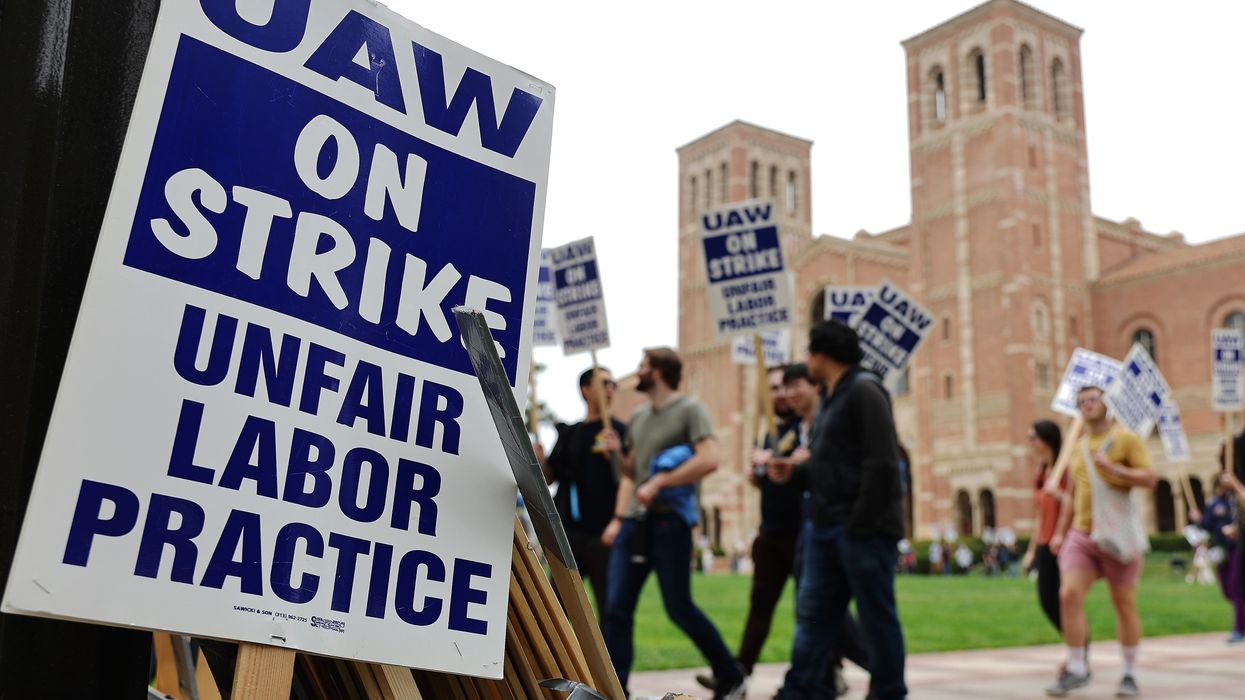The UAW pledged to support injured workers in Colombia who assembled cars and trucks under antiquated, onerous working conditions for one of the largest transnational corporations in the world, General Motors. They were all men, mostly in their 20s, 30s, and 40s when they were fired by GM due to their job-related injuries. When they hired in, they had to sign a pledge they wouldn’t join a union.
This was GM’s routine practice, and they got away with it for a long time, making their factory on the outskirts of the capital city, Bogotá, the most profitable GM plant in Latin America. That is, until dozens of the injured and fired workers formed their own association, ASOTRECOL, and collectively fought back. GM didn’t see that coming, and they’ve tried to be blind to it ever since.
An Injury to One Is an Injury to All
 Members of ASOTRECOL, the injured and fired Colombian GM workers, at their protest encampment at the entrance to the US Embassy in Bogota, July 30, 2025. (Photo by Paige Shell Spurling)
Members of ASOTRECOL, the injured and fired Colombian GM workers, at their protest encampment at the entrance to the US Embassy in Bogota, July 30, 2025. (Photo by Paige Shell Spurling)
A lot of autoworkers in the US and around the world, and the solidarity network that grew to support ASOTRECOL, became familiar with these courageous workers when a group of them waged three successive hunger strikes, with their lips sewn shut. The tent they occupied at the foot of the massive fortress housing the US Embassy, now going on for over 14 years, has become iconic. All this took place in the country with the worst reputation in the world for the assassination of trade unionists—3,000 organizers during 1990-2010—by paramilitaries and Colombian military forces. There’s no record of GM complaining about these murders.
It was only after one full year of the encampment, and a weeks-long hunger strike, that the UAW and AFL-CIO took notice and lent support to the workers’ struggle. When the workers didn’t bend the knee to GM and declined a settlement “final offer,” everything changed—US Labor’s support disappeared, including the UAW’s. My union was gripped in a corruption scandal which ultimately led to changes in the UAW Constitution enabling the membership, for the first time, to directly elect the top leadership.
The reform caucus, Unite All Workers for Democracy (UAWD), which I helped birth, can take credit for this turn of events. A new slate of leaders (UAW Members United) was elected to the International Executive Board in 2022-23, including President Shawn Fain and the UAW’s GM Department Director, Mike Booth.
The current effort on behalf of ASOTRECOL presents a different face of global solidarity, one not predicated on reciprocity or “what’s in it for us?”
Beginning in 2024, Fain and Booth put GM on notice—calling on GM to “deliver justice for the remaining 12 Colombian workers illegally fired after suffering debilitating injuries at GM’s Bogotá plant.” In August, on the 14th anniversary of the tent occupation the UAW posted on Facebook about the struggle, including a YouTube video, with a call to share and post on GM social media.
The UAW is currently building international support, directly engaging with GM, and garnering support from unions around the globe which represent GM workers.
With this campaign, Fain and Booth are redefining the meaning and practice of the UAW’s “international solidarity.” Former (and convicted) UAW President Dennis Williams and Secretary-Treasurer Gary Casteel elaborated on their view in We Don’t Quit: Stories of UAW Global Solidarity published in 2015. They wrote that “global solidarity is a two-way street—one that shows that those we support regularly use their power on behalf of the UAW when we need their help.” One example: the German IG Metal union’s support for the UAW’s organizing campaign at VW in Chattanooga, Tennessee.
The current effort on behalf of ASOTRECOL presents a different face of global solidarity, one not predicated on reciprocity or “what’s in it for us?” ASOTRECOL is not a union. It does not have the organized power to directly support the UAW. Yet the UAW is investing time, energy, staff, and political capital to see this through, with victory not guaranteed. Standing with 12 South American disabled GM autoworkers who were kicked under the bus literally embraces the IWW tenet that, “An Injury to One is an Injury to All.” That’s a cultural norm that UAW members embrace on the shop floor, more often than not. Fain and Booth have made it international.
The Revival of May Day

One of the most interesting outcomes of the “Stand Up Strikes” at the “Big 3” in 2023 was the agreement on the contract expiration dates. The strategy behind choosing April 30, 2028 is an envisioned “general strike” on May Day, International Workers Solidarity Day. The UAW’s aim is to win US unions to align their contracts to expire at the same time under the mantra, “We have more power if we strike together.”
The headline of an editorial by President Fain published in In These Times (May, 2024) read, “May Day 2028 Could Transform the Labor Movement—and the World.” In it he doubles down, explaining the date was chosen “…in hopes the labor movement can collectively aspire to building the power needed to change the world.” Much of the UAW’s focus is on the goals of the proposed coordinated strikes: healthcare as a human right, pensions, improved standard of living, work-life balance. Fain argues: If working people are going to accomplish these objectives, “unions have to start thinking bigger.”
The vision for how May Day 2028 would work out, and what exactly it would look like, deserves a lot of study, discussion, and debate. In the meantime, there have been a lot of rumblings among unionists and progressives asking, “Can we wait that long?” Fain’s pronouncements were made before President Donald Trump and Vice President JD Vance were elected, and before the vile, anti-working class Project 2025 became the US government’s agenda. With the growing military occupation of our Democratic Party-leaning cities, there’s no assurance of fair elections in 2026. Will we be experiencing a full-fledged dictatorship by 2028? We need to reevaluate our thinking.
There’s no better way to begin to demonstrate this truth than with a global one-day shut down on May Day 2026.
May Day 2025 commemorations in the US were historic. An estimated quarter million workers and allies turned out at over 1,100 rallies and marches, nationwide—the most ever! Local organizing committees and coalitions, supported by a national network, May Day Strong, organized for May Day like never before, tearing off the stigma that the billionaire class has used historically to ‘kettle” workers to the more “acceptable” Labor Day parades and barbecues. No more!
However, the UAW—except for a scattering of rank-and-file members and retirees—was absent in the Detroit May Day Rally and March, missing the opportunity to educate and mobilize its members. UAW Region 1 Rep Paul Torrente, who spoke at the rally on the importance of May Day, was the exception. UAW Solidarity House cannot afford to be absent next year, the 140th anniversary of the most hallowed celebration of the global working class.
In Fain’s words, “...To reshape the economy into one that works for the benefit of everyone—not just the wealthy—we need to reclaim our country’s history of militant trade unions that united workers across race, gender, and nationality.”
That history must be reclaimed now and marshalled to build a united working class—not in 2-plus years, but now! We must begin now to recalibrate the culture of our working class movement, by explaining—as Fain does in the In These Times article, “The cause of those Haymarket Martyrs became the cause of the working class around the world, and May 1 became an international holiday commemorating the fight of workers everywhere to reclaim their time and the value of their labor.”
How many UAW members or retirees know about the “Haymarket Martyrs?” Aligning contracts is one thing, but it can’t be done in isolation of building the class consciousness that the struggle of “workers over billionaires” requires. That education cannot begin a moment too soon.
The reality is that the US working class and especially UAW members are torn between nationalism and internationalism—hence the fractures within its ranks over the UAW’s position supporting Trump’s tariff agenda. It’s no surprise because the dominant elites within the organized sector of labor—the AFL-CIO—have been steeped and saturated for over a century in American exceptionalism and make “American Great.”
Next year, with Trump at the helm of US celebrations of its 250th anniversary, the working class will be inundated with appeals to patriotism, jingoism, militarism, patriarchy, white supremacy, flag waving, etc. Ushering in a vigorous celebration of the real history of the US working class in the lead up to May 1 couldn’t be more necessary, to buttress workers’ class consciousness and solidarity. Fain is clear:
May Day is celebrated as an official holiday in countries from Argentina to South Africa to Sweden to Hong Kong, just about everywhere—except its country of origin. When unions organize together across industries and countries, our power is exponentially amplified. The fact is: Without workers, the world stops running.
There’s no better way to begin to demonstrate this truth than with a global one-day shut down on May Day 2026. It falls on a Friday. The UAW and the broader labor movement can call for a day of “no work,” for a three-day weekend, and begin to test its capacity to organize a broad “general strike” in the true meaning of the term. Back to Fain:
A united working class is the only effective wall against the billionaire class’ race to the bottom. For the US labor movement, that means grappling with some hard truths. Like the undeniable fact that it is impossible to protect American jobs while ignoring the plight of everyone else.
Stepping up, as the Fain leadership has done, in defense of the Colombian GM ex-workers is a real-life implementation of what otherwise can easily pass as rhetoric. “As working people, we must come together,” concludes President Fain, “We can no longer allow corporations, politicians, and borders to divide us. It’s time we reclaim May Day for the working class.”


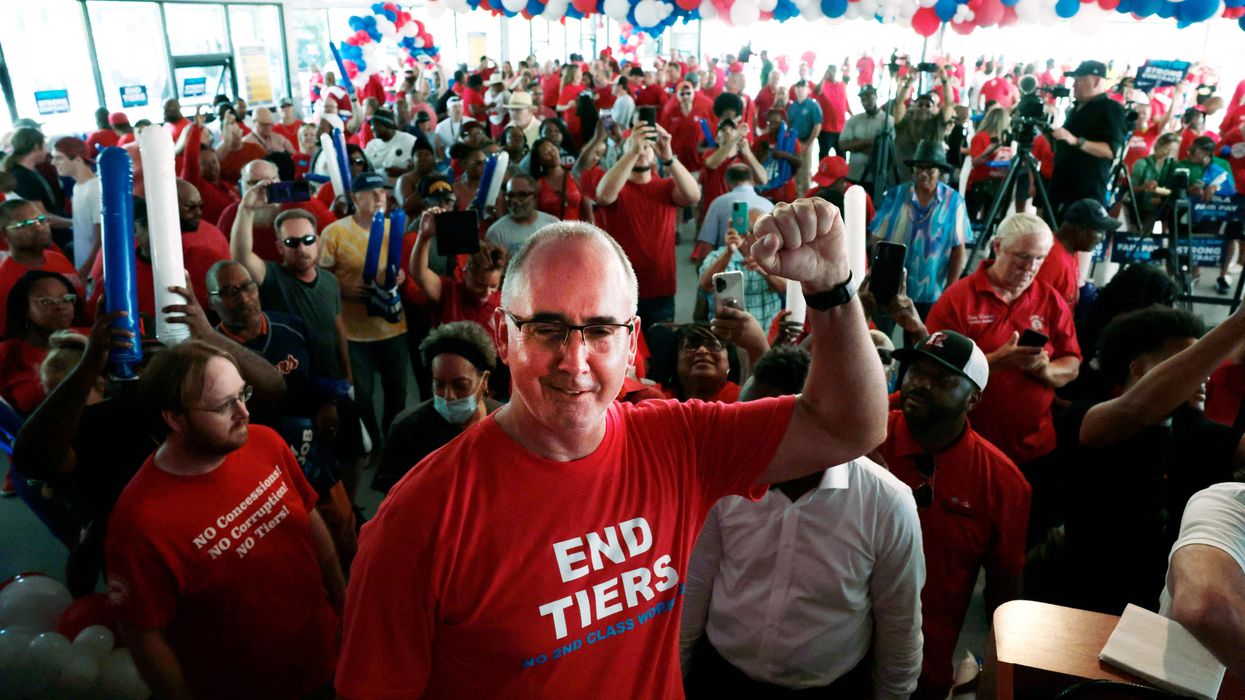
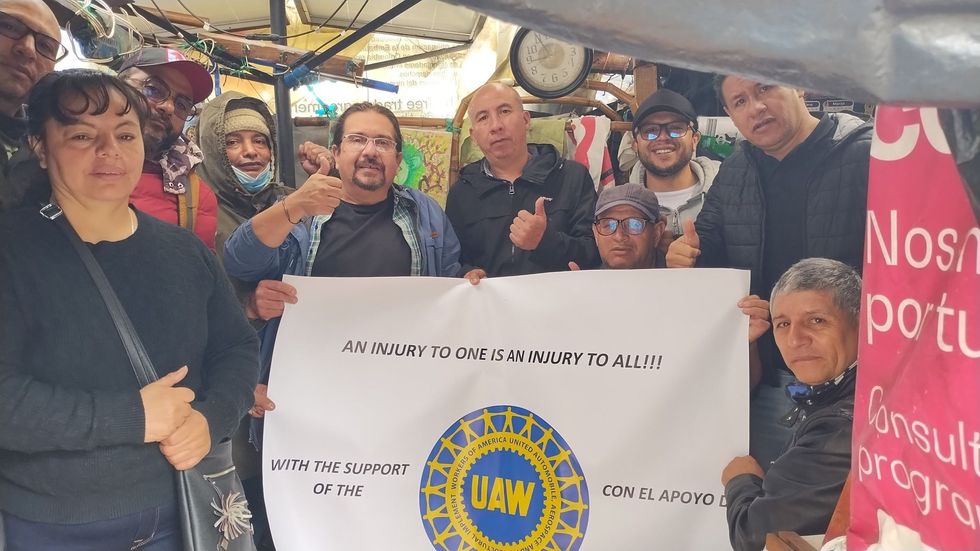 Members of ASOTRECOL, the injured and fired Colombian GM workers, at their
Members of ASOTRECOL, the injured and fired Colombian GM workers, at their 